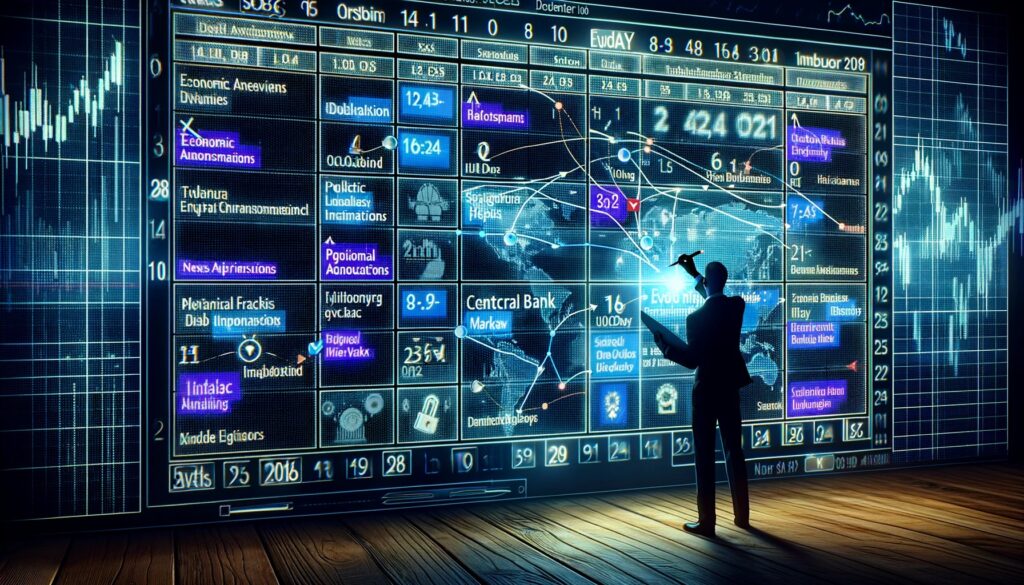The Forex market, with its $6 trillion daily turnover, offers a dynamic battlefield for traders. Among the various strategies employed, event driven trading stands out for its reliance on news and global events to forecast market movements. This comprehensive guide delves into the nuances of event driven trading, equipping traders with the knowledge to navigate the Forex markets adeptly, using news as their compass.
The Essence of Event Driven Trading
Event driven trading is a strategy that focuses on making trades based on significant news events or economic data releases that have the potential to cause substantial movements in the Forex market. This approach requires a blend of quick reflexes, thorough market analysis, and an in-depth understanding of how various events affect currency values.
Understanding Market Reactions to News
The Forex market’s reaction to news can be swift and dramatic, offering lucrative opportunities for prepared traders. For instance, unexpected political turmoil, such as a sudden change in government leadership or geopolitical tensions, can lead to rapid currency devaluations. Conversely, positive economic reports, like higher-than-expected GDP growth, can bolster a currency’s value.

Strategies for Mastering Event Driven Trading
Leveraging the Economic Calendar
An economic calendar is an indispensable tool for event driven traders. It details forthcoming economic indicators, central bank meetings, and political events, complete with forecasts and historical outcomes. Successful traders analyze these calendars to identify events likely to impact the market significantly.
Case Study: Non-Farm Payrolls Report
Consider the U.S. Non-Farm Payrolls (NFP) report, a key economic indicator that often leads to substantial volatility in the Forex market. A higher-than-expected jobs addition can strengthen the USD as it signals economic health, prompting traders to adjust their USD-related positions accordingly.
Real-Time News Sources for Immediate Insights
In the age of information, access to real-time news is crucial for event driven traders. Financial news websites, streaming news apps, and social media channels offer immediate insights, allowing traders to react promptly to market-moving news.
Example: Brexit Referendum
The Brexit referendum in June 2016 serves as a prime example. The unexpected vote to leave the EU caused a tumultuous reaction in the markets, with the GBP plummeting against other major currencies. Traders closely monitoring the situation could react swiftly to mitigate losses or capitalize on the volatility.

Navigating Risks with Prudent Risk Management
Employing Stop-Loss and Take-Profit Orders
Given the high volatility surrounding news events, employing stop-loss and take-profit orders is a critical risk management strategy. These orders ensure that positions are automatically closed at predetermined levels to protect gains or limit losses.
Implementing Tighter Stops During Major Announcements
For instance, ahead of the Federal Reserve’s interest rate decision, a trader might place tighter stop-loss orders on USD pairs to guard against unexpected market swings.
The Crucial Role of Position Sizing
Proper position sizing is essential in event driven trading to manage exposure. By adjusting trade sizes based on the anticipated volatility of an event, traders can ensure that they are not overexposed to any single outcome.
Balancing Trade Sizes
If a trader anticipates high volatility from an upcoming ECB announcement, they might reduce the size of their EUR trades to manage potential risk more effectively.

Challenges and Solutions in Event Driven Trading
The Velocity of Market Responses
One of the main challenges in event driven trading is the market’s rapid response to news. The initial price movements occur within seconds, necessitating a platform that can execute trades with minimal latency.
Overcoming Latency Issues
Traders can overcome this by using high-speed trading platforms and maintaining a stable, fast internet connection to ensure timely execution of trades.
Anticipating Market Sentiment
Predicting how the market will react to news is complex. The same event can lead to different market reactions based on the prevailing economic context or market sentiment.
Utilizing Sentiment Analysis Tools
Traders can use sentiment analysis tools and market commentary to gauge the likely market reaction to an upcoming event, adjusting their strategies to align with the dominant market sentiment.

Conclusion on Event Driven Trading
Event driven trading in the Forex market is a sophisticated strategy that requires an adept understanding of global events, economic indicators, and their potential impact on currency values. By utilizing real-time news sources, leveraging economic calendars, and employing robust risk management techniques, traders can navigate the tumultuous waters of the Forex market with confidence. Success in event driven trading hinges on the ability to anticipate market movements, react swiftly to unfolding events, and adapt strategies to the ever-changing global economic landscape.
FAQs on Event Driven Trading in Forex Markets
How do I start with event driven trading in the Forex market?
To begin with event driven trading, start by familiarizing yourself with the economic calendar and identify major upcoming economic events that are likely to impact currency pairs. Follow reliable financial news sources and practice analyzing how different types of news affect market sentiment and currency values. Utilize demo accounts to simulate trading strategies based on news events without financial risk, gradually moving to live trading as you gain confidence and experience.
Can event driven trading be automated?
Yes, event driven trading can be partially automated using expert advisors (EAs) or trading bots that can execute trades based on predefined criteria related to news events. However, the trader must still perform a significant amount of manual analysis to set the parameters correctly and adjust strategies based on changing market conditions and news developments.
What are the key risks associated with event driven trading?
The key risks include the market’s unpredictable reaction to news, the speed at which market conditions change following major announcements, and the potential for slippage during volatile periods. Traders can manage these risks by employing strict risk management techniques, including setting stop-loss orders, using appropriate position sizing, and being prepared to adjust or close positions quickly in response to unexpected market movements.
How important is timing in event driven trading?
Timing is crucial in event driven trading due to the rapid pace at which markets can move following major news releases. Traders need to be well-prepared in advance of an event, with clear entry and exit strategies. Additionally, using a trading platform that offers fast execution speeds can help minimize the risk of slippage.
How do I analyze the potential impact of a news event on currency pairs?
To analyze the potential impact of a news event, consider the event’s historical significance, market expectations, and the current economic context. Compare the actual data released with market expectations and previous figures to gauge potential market reactions. Consider both the immediate impact and the longer-term implications of the news on economic indicators and monetary policy, which can affect currency strength.
Is it better to focus on a specific type of news for event driven trading?
While some traders specialize in trading specific types of news, such as central bank announcements or employment reports, diversifying the types of news events you trade can reduce risk. By understanding how different events affect the market, traders can seize a wider range of opportunities and spread their risk across various scenarios.
How do I stay updated with the latest news for event driven trading?
To stay updated, subscribe to real-time financial news services, follow reputable economic analysis websites, and use social media platforms where financial analysts and traders share insights. Additionally, economic calendars are essential tools that provide schedules of upcoming significant economic events and indicators.





